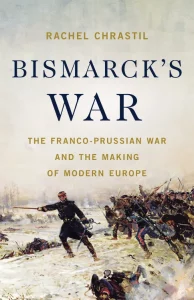Manipulated into declaring war on Prussia in 1870, ailing and criminally indecisive Napoleon III of France was quickly defeated and captured on the battlefield in a disastrous few months that led to the final unification of northern and southern Germany and the creation of Imperial Germany.
The author tells this familiar story with verve, relying on diaries and letters from ordinary soldiers to military commanders and royalty. Enthusiasm was high on both sides but the Germans clearly outdid the French military in well-defined battle plans and overall strategy. Just as important, their leaders were in good health while Napoleon III was ill, uncertain, and issued last-minute changes that were confusing.
The French lines of communication were murky and French retreats were mostly chaotic while German advances were far better organized. The French had better rifles and an early version of the machine gun, but the German armies had bigger and deadlier cannons. Both sides used railroads to move troops and supplies, but the Prussian did so far more efficiently and their generals had recent experience fighting the Danes and the Austrians.
Though the term “shell shock” wasn’t invented yet, it’s clear that troops on both sides were traumatized by the piled-up bodies of dead and wounded in numbers that had never been seen before. Likewise, no city had ever been shelled so constantly and repeatedly as Strasbourg which at one point was hit every twenty seconds by powerful explosives, and the emotional toll on its citizens was severe. And the random shelling of Paris seems a presage of the war in Ukraine.
There are many fascinating pages on the varied reactions around France to Napoleon III’s surrender and the fate of his mammoth army. And the tales of extortion and atrocities committed by troops from various German states in response to the slightest resistance are shocking. The author has an eye for surprising details, like the fact that there was water under the Paris Opera, discovered after drilling through the foundation, and the author claim helped inspire The Phantom of the Opera novel by Gaston Leroux.
As engaging as it is, the book could have been more reader-friendly. Maps are gathered at the front so you need to keep paging back to refer to them when following the specific movements of troops in battle–or trying to follow them. None of the maps show the placement and progress of actual armies as you’d expect from a book so keenly focused on a war.
The chapter on the Prussian sieges of Metz and Strasbourg badly needed plans of the complex fortifications. Just as frustrating, the book lacks a map of the French départments. You have to go to Google to figure out where there is partisan activity, for instance, when the Germans besiege Paris. Likewise when the author talks about where people flee to avoid the German and where exactly German atrocities take place. There are many handsome period illustrations, but their labels are at the back of the book, so if you don’t want to interrupt your reading, you have to guess what they refer to.
Nevertheless, this is a thorough and illuminating study of a war that created a gigantic pivot in world history. ★★★
Lev Raphael is the author of 27 books in genres from memoir to mystery and his reviews have appeared in The Detroit Free Press, The Washington post, The Huffington Post and Salon.

